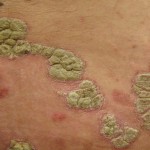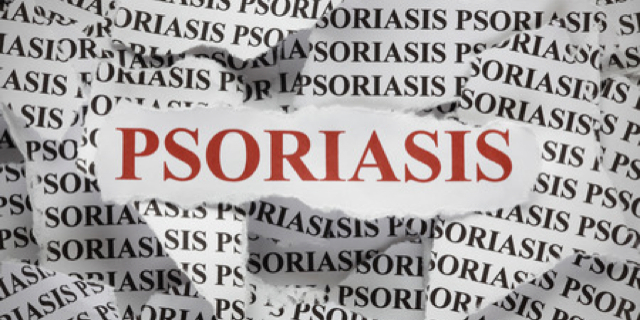“The biggest disease today is…the feeling of being unwanted.” Mother Teresa
Why Psoriasis Awareness Matters
Psoriasis is a systemic autoimmune condition affecting the skin. This means that the immune system of an individual affected by is attacking their skin. Because of its appearance, people with psoriasis often endure isolation and experience social stigma. In fact, one-third say that psoriasis impacts their social interactions and almost 60% say that it negatively impacts their everyday life. Loss of confidence and low self-esteem is common.

By James Heilman, MD – Own work, CC BY-SA 3.0, https://commons.wikimedia.org/w/index.php?curid=944493
Psoriasis is NOT contagious and the lesions that are produced are not infectious. This is one of the most important messages that the National Psoriasis Foundation promotes throughout Psoriasis Awareness Month.
Genetics and Immune Responses
Genetics play a large role in developing this condition, as does the individual’s immune system response to environmental triggers. Those environmental triggers cause the skin cells to start growing at a faster rate than normal. The build-up causes plaques that are itchy and can be painful.
5 Types
There are five types of psoriasis.
1) Ninety percent of people with psoriasis have plaque psoriasis.
2) Guttate, characterized by small teardrop shaped spots, is often triggered by a bacterial, strep infection.
3) Inverse psoriasis also called intertriginous psoriasis is found in skin folds like the armpits.
4) Blisters of non-infectious white blood cells typify another type, called pustular psoriasis. Some versions of this type can be life threatening.
5) Finally, only 3% occurs as erythrodermic. In this type the skin is extremely red, looking as if it has been burned and large sheets of skin peel off. This too is a life threatening version and needs immediate attention.
The condition is further classified by severity. Mild psoriasis is when only 3% of the body’s skin is affected; a moderate classification means between 3 and 10% of the body’s skin has plaques; if over 10% of the body is covered with plaques, you have severe psoriasis.
Psoriatic Arthritis
 Another complication of psoriasis is a form of arthritis. In psoriatic arthritis, in addition to attacking the skin, the immune system attacks joints. Psoriatic arthritis is diagnosed in around 11% of people when they are diagnosed with psoriasis. Another 30% of people with psoriasis eventually develop psoriatic arthritis.
Another complication of psoriasis is a form of arthritis. In psoriatic arthritis, in addition to attacking the skin, the immune system attacks joints. Psoriatic arthritis is diagnosed in around 11% of people when they are diagnosed with psoriasis. Another 30% of people with psoriasis eventually develop psoriatic arthritis.
Like psoriasis, in psoriatic arthritis symptoms flare and then subside. Different joints can be affected at different times. However, it is very important to diagnose early because the inflammation that psoriatic arthritis causes can damage joints. Rheumatologists prescribe immunosuppressants, like methotrexate, leflunomide or cyclosporine. A review of Enbrel, as a treatment, can be found in the Medivizor sample library.
Heart Involvement
So many people still remember “the ‘heartbreak’ of psoriasis” advertisement and the “jokes” associated with this ad. The suffering that people with psoriasis can experience is not funny.
Sadly, people with this condition are at higher risk for some cancers, liver disease, Crohn’s Disease and IBD and depression. Another result of the autoimmune inflammation that is psoriasis is that it affects the cardiovascular system. So there truly is heart involvement.
Awareness of psoriasis means shining a light on a disease many go to great lengths to hide from view. It means pointing out the barriers and impediments that society’s obsession with outer beauty place on those who do not “look” perfect.






Have had psoriasis for 45 years. It is not an easy disease to control. Hopefully one day a cure will be discovered
My psoriasis has flared up again this time on my elbows. Very red and sore then the redness just left. The area is now dry. I am a diabetic and was wondering if this condition can get worst?
interesting one, to follow